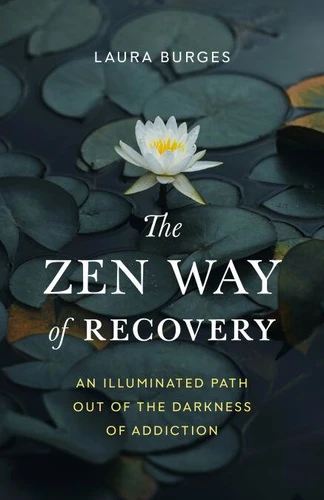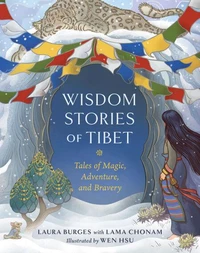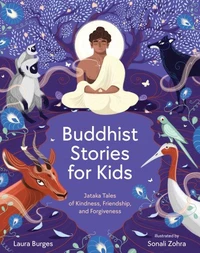LAURA BURGES (Ryuko Eitai) est une enseignante bouddhiste laïque de la tradition Zen Soto. Elle donne des conférences, offre des cours et guide des retraites au centre Zen de San Francisco ainsi que dans d'autres lieux de pratique du nord de la Californie. Laura a enseigné aux enfants pendant 35 ans et elle encadre aujourd'hui d'autres enseignants.
The Zen Way of Recovery. An Illuminated Path Out of the Darkness of Addiction
Par :Formats :
Disponible dans votre compte client Decitre ou Furet du Nord dès validation de votre commande. Le format ePub protégé est :
- Compatible avec une lecture sur My Vivlio (smartphone, tablette, ordinateur)
- Compatible avec une lecture sur liseuses Vivlio
- Pour les liseuses autres que Vivlio, vous devez utiliser le logiciel Adobe Digital Edition. Non compatible avec la lecture sur les liseuses Kindle, Remarkable et Sony
- Non compatible avec un achat hors France métropolitaine
 , qui est-ce ?
, qui est-ce ?Notre partenaire de plateforme de lecture numérique où vous retrouverez l'ensemble de vos ebooks gratuitement
Pour en savoir plus sur nos ebooks, consultez notre aide en ligne ici
- Nombre de pages224
- FormatePub
- ISBN978-0-8348-4517-6
- EAN9780834845176
- Date de parution18/07/2023
- Protection num.Adobe DRM
- Taille726 Ko
- Infos supplémentairesepub
- ÉditeurShambhala
Résumé
An accessible, compassionate guide to Buddhist principles and practices that can help support recovery from addictions and addictive behaviors-written by an experienced lay teacher with long-term recovery. For anyone struggling with addiction, Buddhism offers powerful, grounding wisdom and tools to help support recovery. In The Zen Way of Recovery, Laura Burges shares her experience as a dedicated Zen practitioner who came to terms with her own addiction to alcohol and found support for her recovery.
Through the lens of Buddhist teachings, Burges offers tools and practices which, together with the help of recovery programs, can offer a road to sobriety. Burges is an experienced and compassionate guide, and her message is resonant for people with any type of addictive behavior-and for people who aren't necessarily familiar with Buddhism. Her teachings are drawn from the Buddha's life and teachings (specifically the Eight Awarenesses of the Awakened Being and the Six Paramitas), and the wisdom of Japanese Buddhist priest Dogen Zenji, the founder of the Soto school of Zen, among others. Burges emphasizes the importance of being in an active recovery program, and the teachings and practices she offers in each chapter-including reflections, journaling prompts, meditations, instructions for setting up and altar and zazen-are both a perfect adjunct and powerful reinforcement. Examples of reflections and journaling prompts include: Do you still hear the critical, contemptuous, sarcastic voice of a parent or partner in your own head? Do you sometimes hear yourself mirroring this negative voice with others? What were the models of relationship that you grew up with? What are ways that you can cultivate more patience? Check in with yourself to see if tiredness, hunger, loneliness, or anger is affecting your thinking in the moment.
Through the lens of Buddhist teachings, Burges offers tools and practices which, together with the help of recovery programs, can offer a road to sobriety. Burges is an experienced and compassionate guide, and her message is resonant for people with any type of addictive behavior-and for people who aren't necessarily familiar with Buddhism. Her teachings are drawn from the Buddha's life and teachings (specifically the Eight Awarenesses of the Awakened Being and the Six Paramitas), and the wisdom of Japanese Buddhist priest Dogen Zenji, the founder of the Soto school of Zen, among others. Burges emphasizes the importance of being in an active recovery program, and the teachings and practices she offers in each chapter-including reflections, journaling prompts, meditations, instructions for setting up and altar and zazen-are both a perfect adjunct and powerful reinforcement. Examples of reflections and journaling prompts include: Do you still hear the critical, contemptuous, sarcastic voice of a parent or partner in your own head? Do you sometimes hear yourself mirroring this negative voice with others? What were the models of relationship that you grew up with? What are ways that you can cultivate more patience? Check in with yourself to see if tiredness, hunger, loneliness, or anger is affecting your thinking in the moment.
An accessible, compassionate guide to Buddhist principles and practices that can help support recovery from addictions and addictive behaviors-written by an experienced lay teacher with long-term recovery. For anyone struggling with addiction, Buddhism offers powerful, grounding wisdom and tools to help support recovery. In The Zen Way of Recovery, Laura Burges shares her experience as a dedicated Zen practitioner who came to terms with her own addiction to alcohol and found support for her recovery.
Through the lens of Buddhist teachings, Burges offers tools and practices which, together with the help of recovery programs, can offer a road to sobriety. Burges is an experienced and compassionate guide, and her message is resonant for people with any type of addictive behavior-and for people who aren't necessarily familiar with Buddhism. Her teachings are drawn from the Buddha's life and teachings (specifically the Eight Awarenesses of the Awakened Being and the Six Paramitas), and the wisdom of Japanese Buddhist priest Dogen Zenji, the founder of the Soto school of Zen, among others. Burges emphasizes the importance of being in an active recovery program, and the teachings and practices she offers in each chapter-including reflections, journaling prompts, meditations, instructions for setting up and altar and zazen-are both a perfect adjunct and powerful reinforcement. Examples of reflections and journaling prompts include: Do you still hear the critical, contemptuous, sarcastic voice of a parent or partner in your own head? Do you sometimes hear yourself mirroring this negative voice with others? What were the models of relationship that you grew up with? What are ways that you can cultivate more patience? Check in with yourself to see if tiredness, hunger, loneliness, or anger is affecting your thinking in the moment.
Through the lens of Buddhist teachings, Burges offers tools and practices which, together with the help of recovery programs, can offer a road to sobriety. Burges is an experienced and compassionate guide, and her message is resonant for people with any type of addictive behavior-and for people who aren't necessarily familiar with Buddhism. Her teachings are drawn from the Buddha's life and teachings (specifically the Eight Awarenesses of the Awakened Being and the Six Paramitas), and the wisdom of Japanese Buddhist priest Dogen Zenji, the founder of the Soto school of Zen, among others. Burges emphasizes the importance of being in an active recovery program, and the teachings and practices she offers in each chapter-including reflections, journaling prompts, meditations, instructions for setting up and altar and zazen-are both a perfect adjunct and powerful reinforcement. Examples of reflections and journaling prompts include: Do you still hear the critical, contemptuous, sarcastic voice of a parent or partner in your own head? Do you sometimes hear yourself mirroring this negative voice with others? What were the models of relationship that you grew up with? What are ways that you can cultivate more patience? Check in with yourself to see if tiredness, hunger, loneliness, or anger is affecting your thinking in the moment.







